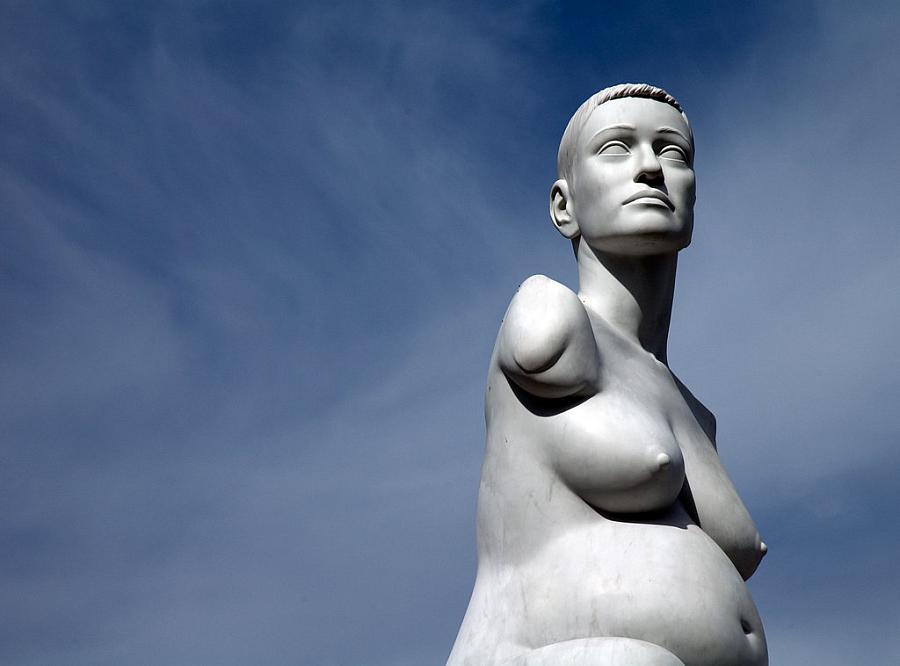For disabled parents, maternity care is a minefield

(Photo by Gaellery via Creative Commons/Flickr)
Today, one in 10 children in the U.S. lives with a disabled parent. This makes households with disabled parents roughly as common as those with disabled children — a statistic at once mathematically self-evident and sociologically inconceivable. While parents of disabled children are more seen and supported than ever, disabled parents remain marginalized, stigmatized, and invisible.
Studies show that this stigma is particularly intense — and particularly damaging — in pregnancy and childbirth. By almost every possible measure, disabled mothers experience worse perinatal outcomes than nondisabled ones. Those outcomes are similar across physical, intellectual, and sensory disabilities, suggesting that they are structural, not biological. And because of disability’s significant and well-established intersection with race and class, those harms fall disproportionately on poor families of color.
I didn’t know any of this when I became pregnant in 2015. I was in my 20s, and healthy aside from a two-decade-old spinal cord injury. My career was successful, my marriage was happy, and I conceived almost as soon as my friend’s doctor removed my IUD.
“It’s too bad I can’t see you after,” she told me. It was only weeks later, when another panicked obstetrician showed me the door, that I began to see how disabled mothers disappear in the medical system.
The belief that childbirth is dangerous and unnatural for disabled people causes serious and well-documented harm. It persists despite the fact that disabled women now give birth at roughly the same rate as nondisabled ones — an enormous jump from just 20 years ago.
“We do see an increased rate of the common pregnancy complications — but it’s not a direct result of the disability, it’s a result of their not getting appropriate care,” said Dr. John Ozimek, a maternal fetal medicine specialist at Cedars-Sinai Medical Center in Beverly Hills. “They’re not getting standard pregnancy treatment.”
Even in California, long the vanguard of the American disability rights movement, perinatal experiences and outcomes are far worse for disabled parents than abled ones, often for reasons that have little to do with their conditions.
L.A. alone is home to about 400,000 disabled adults of reproductive age, and the best available estimates suggest that 76,000 of them are mothers of children under 18. Yet the majority of obstetricians here will not see disabled patients, whether or not they have medically complex pregnancies. Many pressure disabled women to terminate their pregnancies, generally without cause.
L.A. is also home to large and thriving communities of disabled adults, including a significant concentration of Little People and one of the largest and best known deaf communities in the U.S. (Some in these communities reject the term “disabled;” others embrace it.) Those with hereditable conditions like deafness or dwarfism face particular stigma in pregnancy, despite the fact that many feel better equipped to raise children like themselves.
“We had a kind of relief, even knowing there could be medical complications that come up,” said expectant mom Becky Curran Kekula, who recently learned the baby she is carrying also has achondroplasia. “We were excited to have someone like us.”
Meanwhile, the doctors most comfortable with disability and pregnancy are concentrated at research hospitals on the Westside, where public transportation is limited and public insurance can be difficult to use. Here, as elsewhere, disabled mothers search longer for care, travel much farther to reach it, and must be seen far more often than their nondisabled peers. Some come from as far away as Las Vegas and the Central Valley to find an obstetrician in L.A.
Once they do find willing doctors, many disabled women are also required to coordinate outside specialists to verify that they can safely receive an epidural, get a c-section, or fit a baby through their pelvises. Yet disabled women themselves are often not asked the most basic questions about their own care — how they void urine, what positions cause pain, if materials or facilities will be accessible to them — nor is their expertise about their own bodies listened to.
From my own experience, I know that even a healthy, normal pregnancy proceeds very differently for a disabled woman than a nondisabled one. But it wasn’t until I began interviewing experts and other disabled parents for this project that I came to understand the ways in which our experiences are shared, and how structural and institutional biases shape them.
My project for the 2021 California Fellowship will focus on the pregnancy and birth experience of a single disabled Angeleno, leveraging new research funded by the National Institutes of Health to illustrate where her experience intersects with and diverges from the norm for disabled families. It will include the voices of doctors, researchers and disabled parents to show the resilience, ingenuity and joy of disabled parenthood in the face of overwhelming discrimination and erasure.

